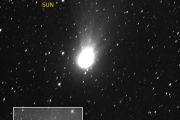
Copernical Team
Revealing Exoplanet Atmospheres with 3D Eclipse Mapping
 A team of astronomers co-led by Cornell University has produced the first three-dimensional map of an exoplanet's atmosphere, revealing WASP-18b's distinct temperature zones-including one region so hot it breaks down water vapor. WASP-18b, an "ultra-hot Jupiter" located about 400 light years from Earth, served as the test case for a mapping technique called 3D eclipse mapping or spectroscopic ec
A team of astronomers co-led by Cornell University has produced the first three-dimensional map of an exoplanet's atmosphere, revealing WASP-18b's distinct temperature zones-including one region so hot it breaks down water vapor. WASP-18b, an "ultra-hot Jupiter" located about 400 light years from Earth, served as the test case for a mapping technique called 3D eclipse mapping or spectroscopic ec New UCF Center Accelerates Research and Clinical Innovation in Space Medicine
 The University of Central Florida is expanding its research, clinical programs, and educational outreach to address the health of space travelers and bring advances in medical technologies to patients on Earth. The College of Medicine is leading this effort by investigating the effects of microgravity, radiation, and isolation on the human body and developing new diagnostics, treatment protocols
The University of Central Florida is expanding its research, clinical programs, and educational outreach to address the health of space travelers and bring advances in medical technologies to patients on Earth. The College of Medicine is leading this effort by investigating the effects of microgravity, radiation, and isolation on the human body and developing new diagnostics, treatment protocols Neutrino experiments combine for precision insight into cosmic origins
 A Michigan State University researcher participated in coordinating a joint analysis of two significant neutrino experiments, T2K in Japan and NOvA in the United States, advancing understanding of the evolution of the universe.
The collaboration merged data from both experiments to refine measurement of neutrino properties. These elusive subatomic particles travel through the universe with
A Michigan State University researcher participated in coordinating a joint analysis of two significant neutrino experiments, T2K in Japan and NOvA in the United States, advancing understanding of the evolution of the universe.
The collaboration merged data from both experiments to refine measurement of neutrino properties. These elusive subatomic particles travel through the universe with High-performance board delivers robust radiation-tolerant computing for space payloads
 Frontgrade Technologies has introduced the SBC-2A72 VPX Single Board Computer, engineered for high-reliability computing in advanced space missions. The board is built around the VA7230 Dual ARM Cortex-A72 processor with integrated GPU, delivering 10.4 GFLOPs and supporting OpenGL and OpenCL standards for payload processing, imaging, and graphics. The SBC-2A72 weighs under 0.65 kilograms and con
Frontgrade Technologies has introduced the SBC-2A72 VPX Single Board Computer, engineered for high-reliability computing in advanced space missions. The board is built around the VA7230 Dual ARM Cortex-A72 processor with integrated GPU, delivering 10.4 GFLOPs and supporting OpenGL and OpenCL standards for payload processing, imaging, and graphics. The SBC-2A72 weighs under 0.65 kilograms and con ESA expands Tokyo office to strengthen partnership with Japan
 The European Space Agency has announced its first Asian office in Tokyo, appointing a staff member at X-NIHONBASHI to deepen ESA's cooperation with Japan's space sector and the Japan Aerospace Exploration Agency (JAXA).
ESA Director of Strategy, Legal and External Matters, Eric Morel de Westgaver, presented the announcement during Nihonbashi Space Week and emphasized the decades-long partn
The European Space Agency has announced its first Asian office in Tokyo, appointing a staff member at X-NIHONBASHI to deepen ESA's cooperation with Japan's space sector and the Japan Aerospace Exploration Agency (JAXA).
ESA Director of Strategy, Legal and External Matters, Eric Morel de Westgaver, presented the announcement during Nihonbashi Space Week and emphasized the decades-long partn AI-driven propulsion design advances spacecraft engineering at Northrop Grumman
 Northrop Grumman Corporation and Luminary Cloud are working together to apply artificial intelligence to spacecraft propulsion, implementing a new physics AI foundation model specifically for thruster nozzle design. The collaboration leverages Northrop Grumman's expertise in propulsion physics and Luminary Cloud's AI platform with NVIDIA's support to enable rapid hardware development for spacecr
Northrop Grumman Corporation and Luminary Cloud are working together to apply artificial intelligence to spacecraft propulsion, implementing a new physics AI foundation model specifically for thruster nozzle design. The collaboration leverages Northrop Grumman's expertise in propulsion physics and Luminary Cloud's AI platform with NVIDIA's support to enable rapid hardware development for spacecr Emerging Trends Shaping the Future of Online Esports Betting
 You're seeing online esports betting explode right now, particularly in markets like Malaysia, where the digital gaming scene continues to thrive. People who love this space, along with those investing money, are paying close attention. Because of big jumps in technology and how connected everyone is globally, esports has become a huge deal in gaming.
You're seeing online esports betting explode right now, particularly in markets like Malaysia, where the digital gaming scene continues to thrive. People who love this space, along with those investing money, are paying close attention. Because of big jumps in technology and how connected everyone is globally, esports has become a huge deal in gaming. Voyager completes ExoTerra acquisition advancing US space propulsion systems
 Voyager Technologies has announced the acquisition of ExoTerra Resource, a developer of electric propulsion systems for space operations. The move aims to address gaps in propulsion capabilities for both defense and commercial markets within the United States.
Voyager Technologies has announced the acquisition of ExoTerra Resource, a developer of electric propulsion systems for space operations. The move aims to address gaps in propulsion capabilities for both defense and commercial markets within the United States. Europe turns to space to boost resilience

The role of space for security was presented at a high-level event in Brussels on Tuesday.
The Red Spider Nebula, caught by Webb
 Image:
The Red Spider Nebula (Webb)
Image:
The Red Spider Nebula (Webb) 































